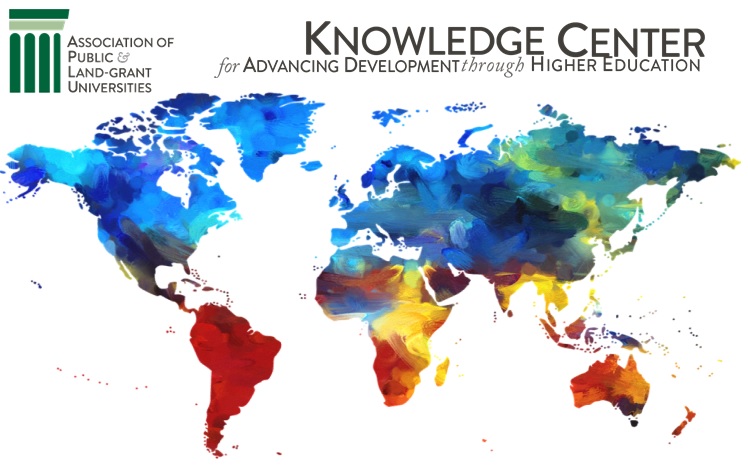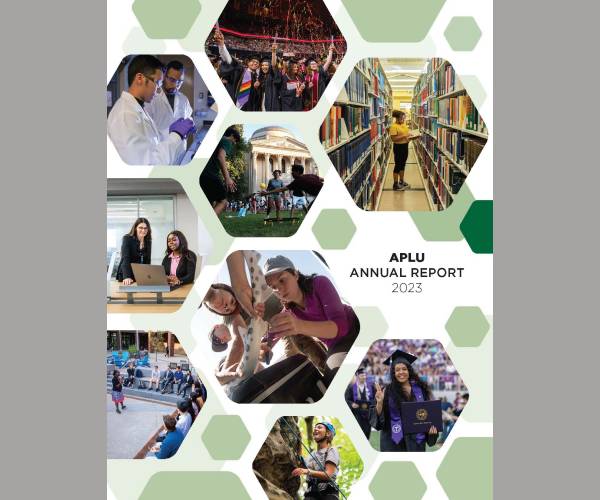Knowledge Center Events

Book Launch: Universities and the Sustainable Development Future
Join the APLU Knowledge Center for Advancing Development through Higher Education for an evening with Dr. Peter H. Koehn, Professor of Political Science from the University of Montana and Dr. Juha I. Uitto, Director of the Independent Evaluation Office of the Global Environment Facility (GEF) to discuss their new book, Universities and the Sustainable Development Future.
About the book
Since the mid-1970s, a series of international declarations that link environment and sustainable development to all aspects of higher learning have been endorsed and signed by universities around the world. Although university involvement in sustainable-development research and outreach has increased substantially, systematic learning from higher-education engagements has been limited.
Universities and the Sustainable Development Future offers institutions of higher learning around the world practical guidelines that can be applied contextually to produce credible evidence regarding the outcome and impact of their teaching, research, and transnational-partnering activities. Drawing on innovative applications of lessons from experience with international-development cooperation, this book demonstrates the utility of a flexible framework that will inspire substantial improvements in the ways universities evaluate and improve their sustainable-development undertakings aimed at promoting Agenda 2030.
This book promotes an inclusive evaluation framework that will allow universities to illuminate sustainable-development outcomes, and it provides a cutting-edge resource for students, scholars, and policy makers with an interest in sustainable development, climate change, and evaluation challenges.
Speaker Bios
Dr. Peter H. Koehn is Professor of Political Science, a University of Montana Distinguished Scholar, a Fulbright New Century Scholar, and recipient of the Association of Public and Land-grant Universities (APLU)’s 2011 Michael P. Malone award for international leadership and the 2012 George M. Dennison Presidential Faculty Award for Distinguished Accomplishment. Over the course of his career, he has taught and conducted research in Ethiopia, Nigeria, Eritrea, Namibia, China, Hong Kong, and Finland. From 1991 through 1996, he co-directed a USAID University Development Linkage Project designed to strengthen the capacity of The University College of Belize to contribute to the sustainable development of Belize, particularly in natural-resource management. Professor Koehn is the founding director of The University of Montana’s Office of International Programs and its academic programs in International Development Studies and Global Public Health. His most recent book is China Confronts Climate Change: A Bottom-up Perspective (Routledge Advances in Climate Change Research Series, 2016).
Dr. Juha I. Uitto is Director, Independent Evaluation Office of the Global Environment Facility (GEF). Since 1999, he has held various evaluation positions with the GEF and the United Nations Development Programme (UNDP), and conducted and managed a large number of programmatic and thematic evaluations of international cooperation at the global, regional, and country levels. Dr. Uitto spent the 1990s in the United Nations University coordinating the university’s environment and sustainable-development research and training programs. His earlier work has included positions in the Nordic Africa Institute and the International Fund for Agricultural Development (IFAD). He was educated at the Universities of Helsinki and Lund. Dr. Uitto has published widely on topics related to environment and natural resources management, sustainable development, environmental hazards, and evaluation. Routledge published his edited book Evaluating Environment in International Development in 2014. The book Evaluating Climate Change Action for Sustainable Development (co-edited with Jyotsna Puri and Rob D. van den Berg) has recently been published by Springer. He also serves as Visiting Professor of Global Practice at Rutgers University. In October 2012, the European Evaluation Society awarded him for “distinguished contribution to evaluation practice.”
To register to attend, visit the event page here.




Stay Connected
X (formerly Twitter)
Facebook
YouTube
LinkedIn
RSS